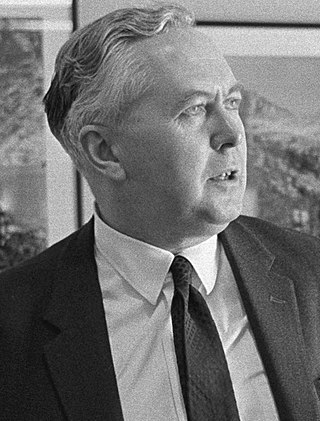Related Research Articles

In the United States, Social Security is the commonly used term for the federal Old-Age, Survivors, and Disability Insurance (OASDI) program and is administered by the Social Security Administration (SSA). The original Social Security Act was enacted in 1935, and the current version of the Act, as amended, encompasses several social welfare and social insurance programs.

The United Kingdom straddles the higher mid-latitudes between 49° and 61°N on the western seaboard of Europe. Since the UK is always in or close to the path of the polar front jet stream, frequent changes in pressure and unsettled weather are typical. Many types of weather can be experienced in a single day. In general the climate of the UK is changeable, often cloudy especially in the more northerly areas of the country, with rain evenly distributed throughout the year.

The Department for Work and Pensions (DWP) is a department of His Majesty's Government responsible for welfare, pensions and child maintenance policy. As the UK's biggest public service department it administers the State Pension and a range of working age, disability and ill health benefits to around 20 million claimants and customers. It is the second largest governmental department in terms of employees, and the largest in terms of expenditure (£187bn).
A means test is a determination of whether an individual or family is eligible for government assistance or welfare, based upon whether the individual or family possesses the means to do without that help.

Harold Wilson was appointed Prime Minister of the United Kingdom by Queen Elizabeth II on 16 October 1964 and formed the first Wilson ministry, a Labour government, which held office with a thin majority between 1964 and 1966. In an attempt to gain a workable majority in the House of Commons, Wilson called a new election for 31 March 1966, after which he formed the second Wilson ministry, a government which held office for four years until 1970.
Housing Benefit is a means-tested social security benefit in the United Kingdom that is intended to help meet housing costs for rented accommodation. It is the second biggest item in the Department for Work and Pensions' budget after the state pension, totalling £23.8 billion in 2013–14.

A cold wave is a weather phenomenon that is distinguished by a cooling of the air. Specifically, as used by the U.S. National Weather Service, a cold wave is a rapid fall in temperature within a 24-hour period requiring substantially increased protection to agriculture, industry, commerce, and social activities. The precise criteria for a cold wave are the rate at which the temperature falls, and the minimum to which it falls. This minimum temperature is dependent on the geographical region and time of year.

The winter of 1962–1963, known as the Big Freeze of 1963, was one of the coldest winters on record in the United Kingdom. Temperatures plummeted and lakes and rivers began to freeze over.

The winter of 1946–1947 was a harsh European winter noted for its adverse effects in the United Kingdom. It caused severe hardships in economic terms and living conditions in a country still recovering from the Second World War. There were massive disruptions of energy supply for homes, offices and factories. Animal herds froze or starved to death. People suffered from the persistent cold, and many businesses shut down temporarily. When warm weather returned, the ice thawed and flooding was severe in most low-lying areas.

The 2008 Central Asia energy crisis was an energy shortage in Central Asia, which, combined with the severe weather of the 2007-08 winter and high prices for food and fuel, caused considerable hardship for many. The abnormally cold weather has pushed demand up for electricity, exacerbating the crisis. The situation was most dire in Tajikistan. An international appeal was made by the United Nations, NGOs, and the Red Cross and Red Crescent for around US$25 million to assist the government. At the time, The UN warned that millions face starvation during the 2008-09 winter.
In the United Kingdom there are different definitions for fuel poverty. In England a household is considered to be in fuel poverty if they are living in a property with an energy efficiency rating of band D or below, and after heating their home to an adequate level, they are below the official poverty line. In Northern Ireland, Scotland, and Wales, the definition of fuel poverty is whether a household needs to spend more than 10% of their income on energy bills to heat their home to an adequate level of warmth.To be considered adequate, the main living room needs to be 21 °C (70 °F), and other occupied rooms 18 °C (64 °F) during the daytime, with lower temperatures allowed at night.
The Social Insurance Fund of the Russian Federation is one of the state budget funds, created to provide for the compulsory social security of Russian citizens. It was created on January 1, 1991, by a joint decree of the Council of Ministers of the Russian Federation and the Federation of Independent Trade Unions of Russia No. 600/9-3 from December 25, 1990.
The Winter Fuel Payment is a state benefit paid once per year in the United Kingdom to people old enough to have been born before a specific date. It is intended to cover the additional costs of heating over the winter months. It was first introduced by the Labour government in 1997, and was first announced by Chancellor of the Exchequer Gordon Brown in his Pre-Budget Statement of that year.
Carer's Allowance is a non-contributory benefit in the United Kingdom payable to people who care for a disabled person for at least 35 hours a week. It was first established as Invalid Care Allowance in 1976, and married women were not eligible. This policy was held to be unlawful sexual discrimination by the European Court in 1986 in the case of Jackie Drake. See Carers rights movement In May 2020 around 1.1 million people in England were entitled to Carer’s Allowance, of which 780,000 people were being paid it, according to the National Audit Office.

The early 2014 North American cold wave was an extreme weather event that extended through the late winter months of the 2013–2014 winter season, and was also part of an unusually cold winter affecting parts of Canada and parts of the north-central and northeastern United States. The event occurred in early 2014 and was caused by a southward shift of the North Polar Vortex. Record-low temperatures also extended well into March.

The Scotland Act 2016 is an act of the Parliament of the United Kingdom. It sets out amendments to the Scotland Act 1998 and devolves further powers to Scotland. The legislation is based on recommendations given by the report of the Smith Commission, which was established on 19 September 2014 in the wake of the Scottish independence referendum.

Social Security Scotland is an executive agency of the Scottish Government with responsibility for social security provision.
The Cabinet Secretary for Social Security and Older People was a position in the Scottish Government Cabinet. The Cabinet Secretary had overall responsibility for social security, equality and human rights. The Cabinet Secretary was assisted by a junior Minister, the Minister for Older People and Equalities.

The United Kingdom cost-of-living crisis is an ongoing event starting in 2021, in which prices for many essential goods in the United Kingdom began increasing faster than household incomes, resulting in a fall in real incomes. This is caused in part by a rise in inflation in the UK, as well as the economic impact of foreign issues such as the global COVID-19 pandemic, the Russian invasion of Ukraine and post Brexit trade. The UK's cost of living is the most affected of advanced economies. While all in the UK are affected by rising prices, it most substantially affects low-income persons. The British Government has responded in various ways, such as by making provision for a £650 grant for households in receipt of means-tested benefits, including Universal Credit.

The November 1993 United Kingdom budget was delivered by Kenneth Clarke, the Chancellor of the Exchequer, to the House of Commons on 30 November 1993. It was the second budget to be presented in 1993, and the first to be presented by Clarke following his appointment as Chancellor by Prime Minister John Major earlier that year. The November 1993 budget was also the first in the modern era to be held in the autumn, the government having decided to move the date of the budget so it could outline its tax and spending plans at the same time.
References
- ↑ "Background and methodology: Cold Weather Payment estimates 2022 to 2023". GOV.UK. Retrieved 8 December 2022.
- ↑ "Social Security Scotland - Low Income Winter Heating Assistance changes name to Winter Heating Payment". Social Security Scotland. Retrieved 8 December 2022.